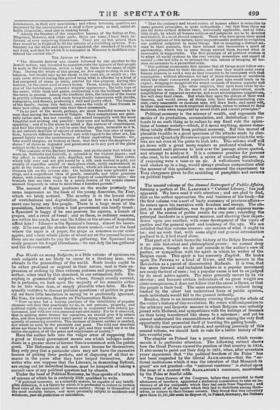Few Words on many Subjects, is a little volume of
opinions on such subjects as are likely to occur to a thinking man, who attends to the proceedings of the world. Such books ought to be either profound or original in their nature, neat in their ex- pression, or striking by their extreme justness and propriety. The author, when tried by this standard, in our estimation, fails. Ex- cepting in grammatical subjects, where, though usually correct, he is pedantic, we look upon the majority of his remarks either to be trite when true, or simply plausible when false. He fre- quently ventures to discuss political questions : of politics in gene- ral. we have little hesitation in saying he is profoundly ignorant. He thus, for instance, disserts on Parliamentary Reform.
"Now no man but a furious partisan of the infallibility of popular clamour will deny that practically we do, in our persons, property, and political rights, enjoy as much freedom as is consistent with orderly go- vernment, and with our own personal ease and safety. For be it observed, that in seeking more licence for ourselves, we should give it to others also, and thus augment every man's power of doing mischief, and conse- quently of annoying ourselves. This increase of licence neither is wanted, nor would be used, by the peaceable and good. The wild and dissolute alone are those to whom it would be a gift, and they would use it to the entire disruption of all the peace and enjoyments of society."
Here the author falls into the vulgar error of supposing that .a good or liberal government means one which indulges indivi- duals in a greater share of licence than is consistent with the public good. The Reformers do not seek more licence for themselves; they only pray that a particular class may not have the excessive licence of picking their pockets, and of. disposing of all that re- mains in the purse after they have helped themselves. Any writer who can suppose that the'Liberals, in demanding Reform, ' are crying out for individual licence, must be incapable of taking a correct view of any political question but by chance. Under the head of Political Economy, he thus speaks of a brawl.' of science of which he is certainly little qualified to write. "If political economy, as a scientific system, be capable of any intelli- gible definition, it is a theory by which it is pretended to reduce to certain fixed rules all the operations of human society ; things in themselves of the most mutable nature, and most peculiarly subject to accidents and Volutions, pest all prediction or calculation. .
"That the ordinary and broad course of human affairs is reducible to many general principles, is quite indisputable ; but that from them we can lay down certain definite rules, universally applicable, and of infal.
lible truth, by which all human volition and judgment are to be directed and limited, is a most absurd conceit. Those who have given their mind to investigations of this nature, have unquestionably assisted to enlighten our political judgment in many things. But in assigning a distinct sci. ence to their pursuits, they have infused into themselves a spirit of partisanship, which has in some things carried them beyond what is reasonable or supportable. The first principle of all political wisdom is to adapt all social systems to the ever varying necessities and aspect of society ;—the last folly is to attempt the vain labour of bringing all hu- man occurrences to a prescribed scale.
"Our political economists first assume that all things must follow cer- tain rules prescribed by their theories, and then they would order every human concern in such a way as they conceive to be consistent with that assumption ; without allowance for any of those thousands of accidents which the whole concurrent experience of past ages would teach us to expect; bringing to nought all the wisest counsels of human sagacity and human pretensions. Like other empirics, they spoil their trade by at- tempting too much. To the merit of much sound observation, muck simplification of apparent mysteries, and some advantageous suggestions, few will deny their claim. But when they open the sluices of their wild theories, and would sweep all things into their indiscriminating cur- rent, every reasonable or cautious man will draw back; and many will,. in their repugnance to such empirical discipline, refuse to submit to their doctrines, even when supported by sound truth and correct principles."
Political economy is the science of wealth, and expounds the modes of its production, accumulation, and distribution : it pre- tends to no such thing as to reduce to any fixed rule the opera- tions of human society—which, if it mean anything, means some- thing totally different from political economy. But this morsel of • plausible twaddle is a good specimen of the attacks made by cler- gymen and Quarterly Reviewers upon investigations which the wri- ters are not even at the pains to look into. This solemn stuff will go down with a great many readers as profound wisdom. We recommend such persons to look over the passage above quoted, and attempt to analyse it. It is a common practice for persons who read, to be contented with a series of sounding phrases, as if reasoning were a tune or an air. A well-chosen vocabulary, well shaken up in a bag, would always produce composition after the manner of this quotation : we recommend the experiment to Tory clergymen given to the scribbling of pamphlets and reviews on political topics.


























 Previous page
Previous page